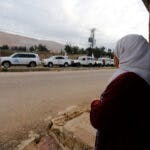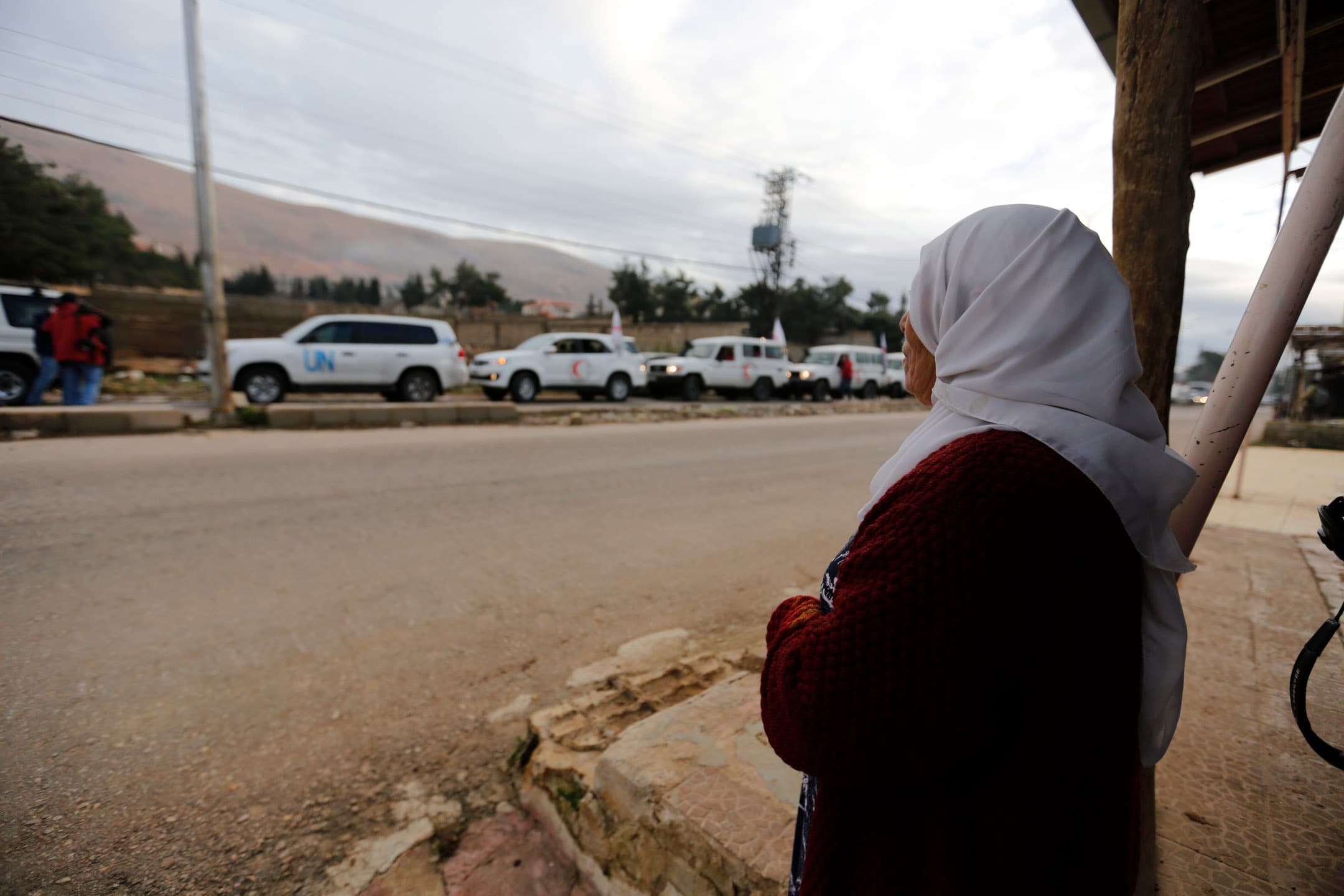
Counterterrorism and Humanitarian Action in Syria
7 September 2021Counterterrorism measures can have an impact on humanitarian programmes. This fact sheet looks at restrictions and requirements of counterterrorism measures humanitarian actors have to comply with, specifically relating to the conflict in Syria.
1. Which counterterrorism measures pose the greatest challenges for humanitarian action?
In order to capture the evolving manifestations of terrorism, the acts criminalised by the Security Council and by states, have become progressively more remote from actual acts of violence. As far as humanitarian action is concerned, it is the measures relating to the provision of funds or assets or other types of support that raise the most significant tensions.
Restricting the flow of funds to organisations designated as terrorist is a core component of the international community’s counterterrorism strategy. As a matter of law, this is achieved by two principal means: first, by financial sanctions against groups designated as terrorist. These sanctions require states to freeze their assets, and prohibit providing funds, financial assets or economic resources to such groups directly or indirectly.
The second means are criminal counterterrorism measures, which make it an offence to carry out a range of activities that may provide financial assistance or other forms of support to designated groups or for the commission of terrorist acts.
Since 2001, the Security Council has required states to criminalise an ever-broader range of forms of support to terrorism. Security Council Resolution 2178 (2014) on ‘foreign fighters’ requires states to criminalise travel for the purpose of participation in terrorist acts.
In giving effect to this resolution, a small number of states have enacted extremely broad crimes. As the areas to which foreign fighters are likely to travel are frequently areas of conflict where humanitarian activities are also conducted, there is a risk that such measures may negatively impact travel of staff of humanitarian organisations.
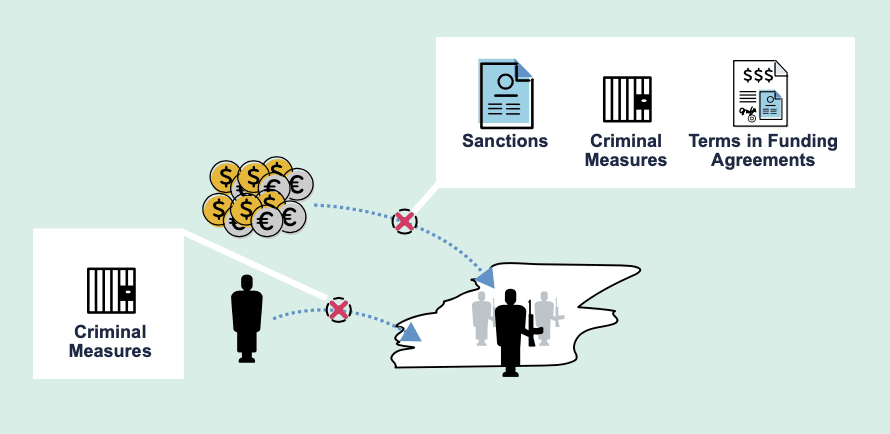
2. Where are these restrictions found?
There are three principal sources of counterterrorism restrictions.
1) The 1999 International Convention for the Suppression of Terrorist Financing. This was the first instrument to address the topic and requires state parties to make it an offence to: provide or collect funds by any means, directly or indirectly, unlawfully and wilfully, with the intention that they should be used, or in the knowledge that they are to be used, in full or in part, in order to carry out an act of terrorism.
2) Since 2001, the UN Security Council has taken centre stage in developing the international counterterrorism legal framework, requiring states to take a range of measures. These include the imposition of financial sanctions on groups designated as terrorist. This has been done in two different ways.
The Council has established a sanctions regime specifically focusing on ISIL (Da’esh) / Al Qaeda and affiliates. As of June 2021, 72 groups and 425 individuals are designated under this regime.
These sanctions prohibit making funds, financial assets or economic resources available directly or indirectly to designated persons or groups.
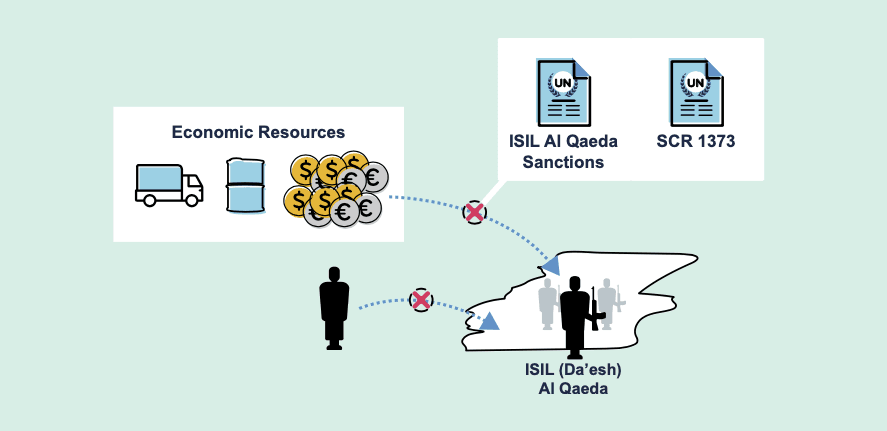
In addition, Security Council Resolution 1373 (2001), the first in the series of thematic counter-terrorism resolutions, requires states to impose similar financial sanctions on terrorist groups. The resolution does not include a list of designated persons or groups. It is left to states and relevant regional inter-governmental organisations, such as the EU, to develop their own lists. This has led to a challenging lack of uniformity as different states have designated different entities, or particular parts of groups.
Other resolutions in this series require states to take a wide range of measures to counterterrorism. For example, Security Council resolution 2178 (2014) on ‘foreign fighters’ requires states to criminalise travel ‘for the purpose of the perpetration, planning, or preparation of, or participation in, terrorist acts, or the providing or receiving of terrorist training’.
The third source of counterterrorism restrictions are funding agreements for humanitarian action. Donors to humanitarian action — states and intergovernmental organisations like the EU — have imposed restrictions and requirements in their funding agreements to ensure that funds do not reach designated persons and entities.
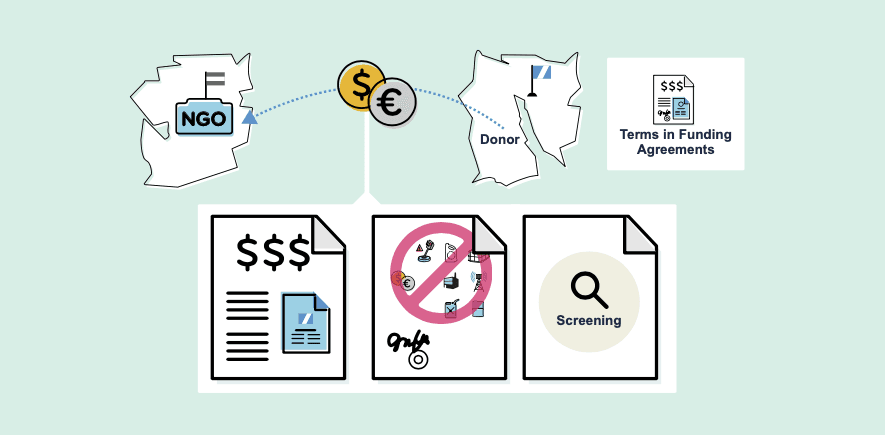
3. Why do counterterrorism measures pose a problem for humanitarian actors?
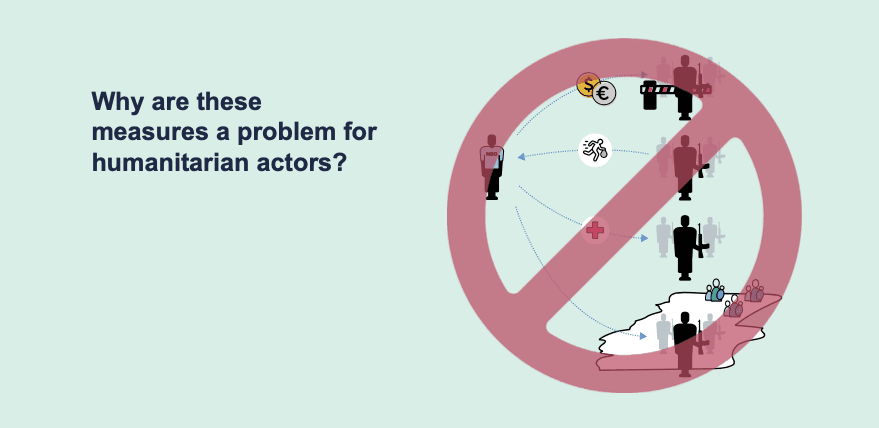
The groups designated under counterterrorism measures are frequently organised armed groups parties to non-international armed conflicts with control over civilian populations in severe need. These include Al Qaeda in the Arab Peninsula in Yemen, Hamas in the Gaza Strip, ISIS affiliates in Syria and until recently Iraq, and in the Sahel region, and Boko Haram in Nigeria.
Problems arise because the prohibitions in the counterterrorism measures have been interpreted extremely broadly. There is a real risk that transactions and activities carried out by humanitarian actors may fall within the scope of the restrictions. There are many ways this could happen:
4. No ‘no contact’ requirement
These are the key counterterrorism restrictions that exist. The greatest source of unwarranted self-restriction by humanitarian actors is the misperception that counterterrorism measures prohibit mere contact with designated persons or groups.
No such prohibition exists. Indeed, such a prohibition would conflict with international humanitarian law. Common Article 3 of the Geneva Conventions expressly foresees the possibility for humanitarian actors to offer their services to both sides in non-international armed conflicts — states and organised armed groups. This implicitly recognises the possibility of liaising with such groups, even if they are designated under counterterrorism measures, as do other rules regulating humanitarian operations in non-international armed conflicts.

Sanctions do not prohibit contact. Financial sanctions prohibit making funds or other assets available directly or indirectly to designated persons and groups, but do not preclude contact. In 2020, this was expressly noted in relation to EU sanctions by the European Commission:
Are Humanitarian Operators allowed to liaise with designated persons if this is needed to provide humanitarian assistance to the civilian population [...] in the context of COVID-19 pandemic?
Yes. Humanitarian Operators may liaise with designated persons if this is needed in order to organise the provision of humanitarian aid in a safe and efficient manner.
Therefore, if a designated person intervenes in a humanitarian transaction, this does not automatically mean that the transaction must be abandoned. Insofar as no funds or economic resources are made available to a designated person, [EU sanctions] do not prohibit liaising with the former.
Similarly, no prohibition on contact exists in counterterrorism conventions, Security Council resolutions, or domestic counterterrorism laws. The domestic measures of two states — Australia and Nigeria — include crimes that relate to meetings with terrorist groups, but neither prohibit such meetings when they are for the purpose of discussing humanitarian action.
The only instance in which contact with a designated group is prohibited as a matter of law is in the funding agreements of one donor — USAID — in relation to operations in one context: the Gaza Strip.
5. Cascading effects on commercial actors
The problems are aggravated by the fact that it is not just humanitarian actors that must comply with counterterrorism measures. Commercial actors must also do so, not providing funds or other assets or financial services to them directly or indirectly, including via the NGOs with whom they conduct commercial transactions.
Fears of violating these measures, coupled with the reality that humanitarian organisations are rarely profitable clients, have led to a significant restriction in the financial services banks are willing to provide to them. These have been so severe as to threaten humanitarian actors’ capacity to deliver in areas perceived as ‘high risk’.
While attention has focused on the banking sector, other commercial actors that provide goods and services to humanitarian organisations, such as insurers, freight companies and providers of commodities are also restricting their engagement.
6. How to resolve the tensions?
As a matter of law, the tensions between counterterrorism measures and humanitarian action can be avoided by including measures to safeguard humanitarian action which reduce the risk of liability and provide reassurance to commercial actors.
Neither the 1999 Terrorist Financing Convention nor Security Council Resolution 1373 refers to, let alone excludes, humanitarian action. This is not surprising, as both instruments were adopted before the impact of such measures on humanitarian action was identified. It is precisely because they did not include safeguards that problems are now arising.
As tensions have become apparent, progressively more significant steps have been taken to avoid and mitigate the adverse impact of counterterrorism measures on humanitarian action. In resolution 2462 (2019), the Security Council expressly demanded:
that Member States ensure that all measures taken to counter terrorism, including measures taken to counter the financing of terrorism as provided for in this resolution, comply with their obligations under international law, including international humanitarian law, international human rights law and international refugee law.
This is a positive development, relevant to all counterterrorism measures — crimes and sanctions. To date sanctions, both the ISIL/Al Qaeda regime and other counterterrorism regimes that states may have adopted pursuant to Security Council Resolution 1373, do not include express safeguards for humanitarian action. More progress has been made in relation to counterterrorism crimes, as reflected in the approach taken by states when adopting new measures, including in some cases predating Security Council Resolution 2462 (2019). These include:
7. Which counterterrorism measures must NGOs comply with?
NGOs and their staff must comply with the counterterrorism measures adopted by several different states.
They include the measures directly applicable to them such as:
Additionally, funding agreements concluded with states frequently require recipients to comply with the counterterrorism measures adopted by the donor state. This is a way for that state’s measures to become indirectly applicable to the recipient, via the contract.
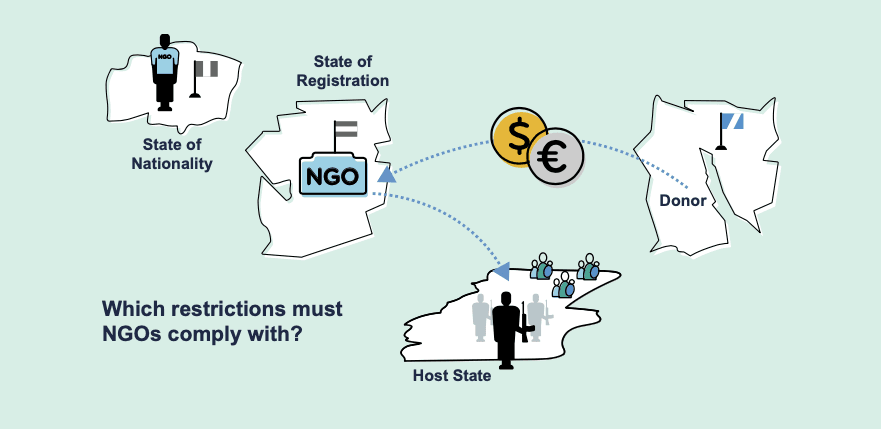
8. What are the key counterterrorism measures relevant to humanitarian actors in Syria?
In addition to the measures adopted by Syria, that are not addressed here, humanitarian actors operating in Syria must be aware of a number of measures adopted by third states.
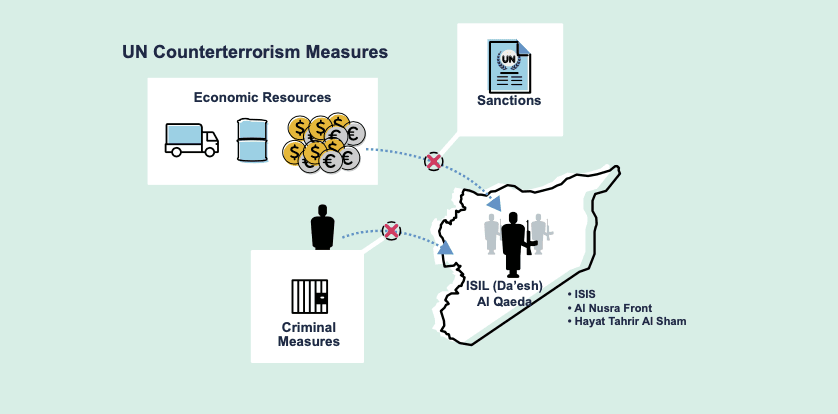
Financial sanctions
The first set of restrictions are those that arise as a result of the inclusion of ISIS affiliates operative in Syria in the UN ISIS/Al Qaeda sanctions. These groups include ISIS, and Al-Nusra Front/Jabhat Fateh al-Sham/Hayat Tahrir al-Sham.
These designations bring into play a number of restrictions, including the prohibition on making funds, financial assets or economic resources available directly or indirectly to such groups.
All UN member states must give effect to these measures.
Prohibition on travel
Prohibitions on travel to areas under the control of designated groups. From 2014 to 2017, Australia designated Raqqa province for the purpose of its foreign fighter legislation; while Denmark designated a number of areas in Syria for the purpose of its law.
Restrictions in funding agreements
A final set of counterterrorism restrictions are those in funding agreements. Frequently, they require recipients to comply with the donor’s counterterrorism laws. One particularly problematic restriction is addressed in the Fact Sheet on Screening of Final Beneficiaries of Humanitarian Programmes.
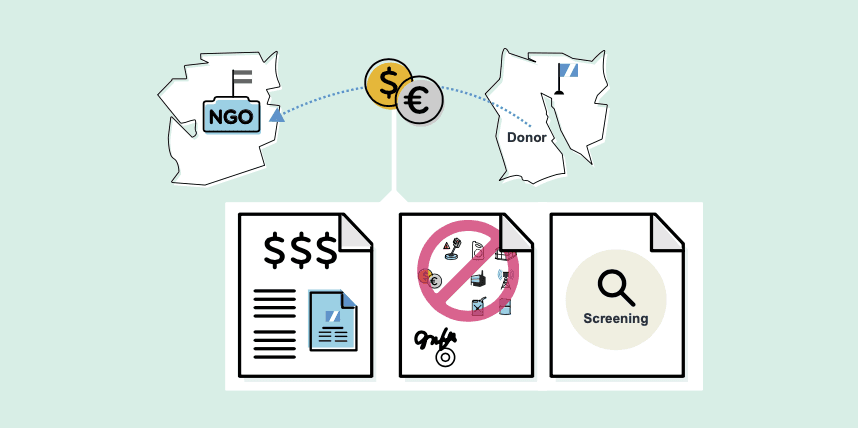
Additional US measures
The US has adopted financial sanctions against groups designated under UN ISIL Al Qaeda sanctions and other groups and persons it designates as ‘Specially Designated Global Terrorists’. These include ISIL and the Al Nusra Front.
US sanctions are broader in scope than UN measures. In addition to funds and assets they also prohibit making services available, directly or indirectly. In theory it is possible to apply for specific licences from the Office of Foreign Asset Controls (OFAC) to provide charitable contributions to designated persons or groups.
The US has also designated the Al Nusra Front as a Foreign Terrorist Organization (FTO). This has a number of legal consequences. Most significantly for humanitarian actors, it brings into play the criminal measures of the Material Support Statute.
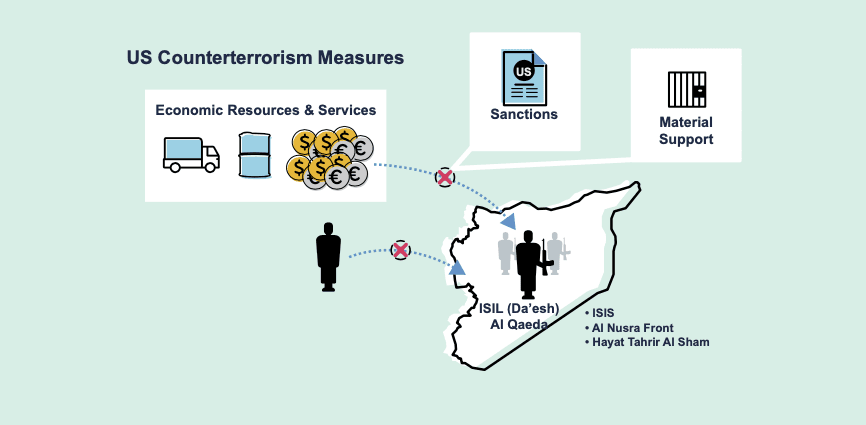
These make it unlawful to knowingly provide ‘material support or resources’ to a FTO. The definition of material support is very broad:
any property, tangible or intangible, or service, including currency or monetary instruments or financial securities, financial services, lodging, training, expert advice or assistance, safehouses, false documentation or identification, communications equipment, facilities, weapons, lethal substances, explosives, personnel (1 or more individuals who maybe or include oneself), and transportation, except medicine or religious materials.
While the expression ‘material support’ is often used colloquially to refer to the various prohibitions on making funds or assets available to designated groups, this extremely broad prohibition is only used in the US criminal measures.
Header Photo: In Wadi Barada in Syria, a woman watches a convoy carrying aid supplies on its way to Madaya. © UNICEF/Sanadiki
